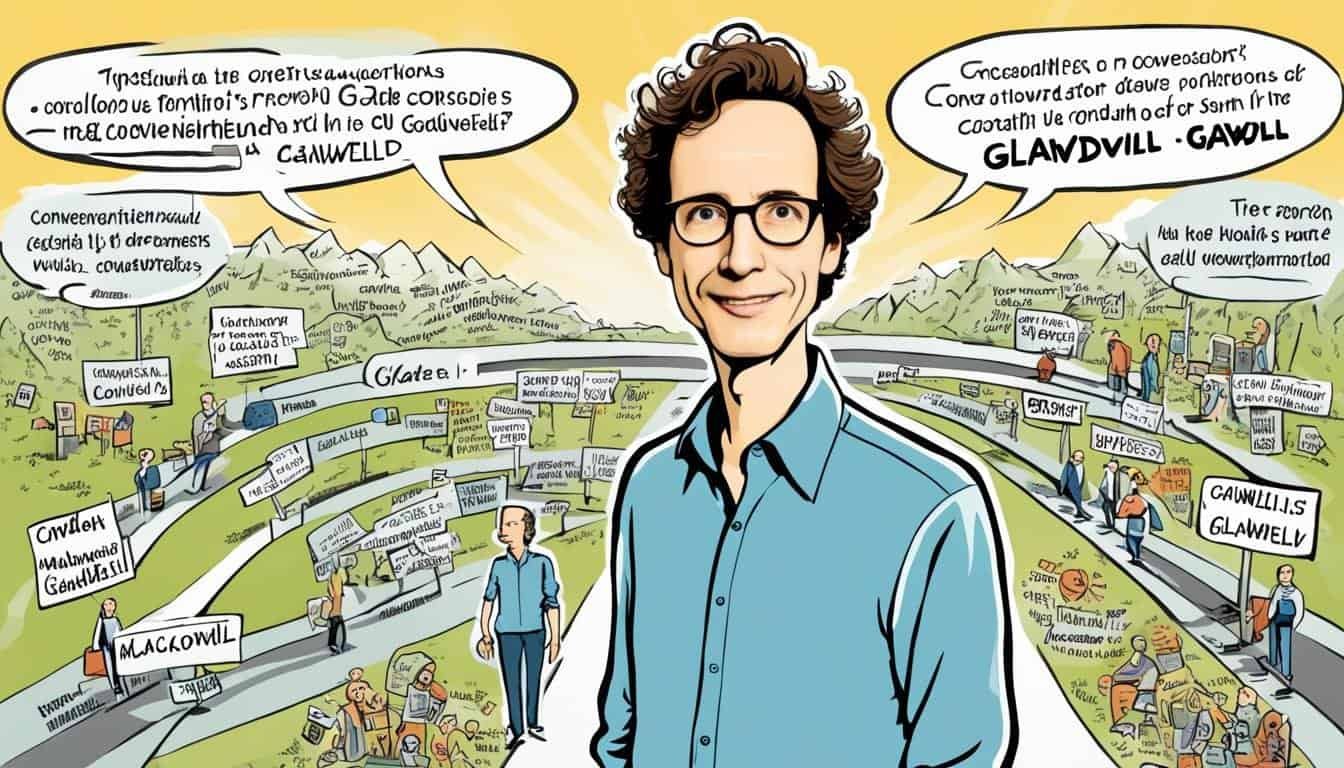Insights and Wisdom: Lessons from Malcolm Gladwell
“Don’t overestimate your wisdom, especially while making a judgment on people.” – Malcolm Gladwell
Malcolm Gladwell, a renowned bestselling author, has captured the hearts and minds of readers with his thought-provoking work. Through his books, podcasts, and talks, Gladwell offers a unique perspective on human behavior and success. Whether delving into the power of judgment or exploring the intricacies of cultural intelligence, his insights have the power to transform our understanding of the world.
Key Takeaways:
- Malcolm Gladwell provides valuable insights and lessons through his books, podcasts, and talks.
- His work challenges conventional wisdom and offers new perspectives on human behavior.
- Lessons include the power of judgment, the importance of cultural intelligence, and the significance of deliberate practice.
- Gladwell’s ideas can be applied to personal and professional growth, fostering success and making a lasting impact.
- Remember not to overestimate your wisdom, especially when making judgments about others.
The Power of Judging People: Lessons from “Talking to Strangers”
In his book “Talking to Strangers,” Malcolm Gladwell delves into the intricate dynamics of human judgment and explores why our ability to accurately assess others can sometimes falter. Gladwell challenges the notion that we can easily understand and interpret people’s intentions, motivations, and true character. He argues that our default tendency to trust can lead to misjudgments and the exploitation of this trust. Through thought-provoking analysis and real-life examples, Gladwell sheds light on the complexities of human interactions and offers invaluable insights on how to improve our ability to judge others.
“When it comes to interpreting people’s behavior, we often default to a misplaced sense of trust and familiarity. This can hinder our understanding and prevent us from seeing the warning signs that may be right in front of us,” Gladwell asserts.
Gladwell demonstrates the potential consequences of misjudging strangers through notable examples, such as the case of Bernie Madoff, who perpetuated one of the most significant financial frauds in history. By examining the factors that contribute to these misjudgments, Gladwell encourages readers to question their assumptions and biases, emphasizing the need for critical thinking and skepticism.
By understanding the limitations of our judgment and cultivating a healthy level of skepticism, we can become more discerning in our interactions and avoid falling victim to deception. Gladwell’s insights remind us that genuine understanding requires a deeper level of evaluation and attentiveness to the nuances of human behavior.
The Importance of Context
Gladwell’s analysis also emphasizes the impact of context on our ability to judge people accurately. He elucidates how external influences, such as social norms, cultural differences, and situational factors, can significantly shape our perception of others. Through a variety of case studies, including the infamous case of Sandra Bland and her interaction with a police officer, Gladwell highlights the importance of considering context when evaluating human behavior.
While it may be challenging to grasp the complete context in real-time interactions, Gladwell suggests that it is crucial to approach judgments with humility and an awareness of our own biases. By actively seeking to understand the context in which individuals behave, we can develop a more nuanced and comprehensive understanding of human interactions.
Enhancing Our Judgement
To improve our ability to judge others effectively, Gladwell proposes various strategies and considerations. These include:
- Questioning assumptions: Rather than relying on surface-level observations or initial impressions, challenge preconceived notions and seek deeper insights into an individual’s behavior.
- Seeking multiple perspectives: Embrace diverse viewpoints and engage in open dialogue to expand your understanding and challenge your own biases.
- Developing situational awareness: Consider the broader context and external factors that may influence an individual’s behavior and decision-making process.
- Practicing empathy: Cultivating empathy allows us to step into others’ shoes and gain a deeper understanding of their experiences, motivations, and challenges.
By incorporating these practices into our interactions, we can become more discerning judges of character and build stronger connections with those around us.
The Art of Storytelling: Lessons from Malcolm Gladwell’s Audiobooks and Podcast
In addition to his bestselling books, Malcolm Gladwell’s audio delivery is highly praised for its engaging storytelling. Through his audiobooks and podcast, Gladwell offers a unique and immersive experience that brings his ideas to life.
Audiobooks: Real Interviews and Enriching Content
Gladwell’s audiobooks, such as “Talking to Strangers,” go beyond the written word. They offer the added dimension of real interviews with individuals relevant to the book’s content. These interviews provide valuable insights and perspectives that enhance the overall listening experience.
By incorporating real voices and personal narratives, Gladwell creates a deeper connection with his audience. Listeners can engage with the stories, gaining a more profound understanding of the concepts explored in the books.
“Malcolm Gladwell’s audiobooks have revolutionized the way I consume information. The addition of interviews and real voices brings the stories to life, making the lessons even more impactful and relatable.” – Listener testimonial
Podcast: Exploring History and Human Behavior
Gladwell’s podcast, “Revisionist History,” takes listeners on a journey through historical events, providing a new perspective on human behavior. With his signature storytelling style, Gladwell delves into intriguing stories that challenge conventional wisdom and shed light on hidden truths.
Through thought-provoking analysis and expert interviews, Gladwell uncovers remarkable insights into various subjects, from education and art to crime and social issues. Each episode offers a captivating exploration of the intricacies of human nature.
Listening to “Revisionist History” allows professionals and enthusiasts alike to expand their knowledge and gain a fresh understanding of familiar topics.
“Malcolm Gladwell’s podcast is a treasure trove of captivating stories and eye-opening analysis. It’s like taking a masterclass in history and psychology, all wrapped in a compelling narrative.” – Podcast enthusiast
The Immersive Listening Experience
Whether through audiobooks or podcasts, Gladwell’s audio resources amplify the impact of his ideas. His delivery style, coupled with engaging storytelling, immerses individuals in a world of knowledge and inspiration.
By embracing the art of storytelling, Gladwell captures the attention of his audience and leaves a lasting impression. These audiobooks and podcasts offer a remarkable opportunity for personal and professional growth while deepening our understanding of human behavior and the world around us.
Overcoming Dyslexia: Lessons from “David and Goliath”
In his book “David and Goliath,” Malcolm Gladwell explores the remarkable achievements of individuals with dyslexia. He emphasizes how these individuals develop unique skills to compensate for their condition, leading to extraordinary accomplishments.
“Dyslexia may present challenges, but it can also nurture resilience and drive individuals to turn their disadvantages into advantages,” says Gladwell.
Gladwell’s research challenges the notion that dyslexia is a hindrance to success. Instead, he highlights the importance of resilience and adaptability in overcoming challenges. By showcasing the stories of successful dyslexics, such as Richard Branson and David Boies, Gladwell demonstrates how these individuals have leveraged their abilities to achieve greatness.
The Power of Resilience and Adaptability
Gladwell emphasizes that dyslexia is not a direct cause of success. Instead, it is the ability to persist and adapt that leads to exceptional accomplishments. Dyslexics often develop strong problem-solving skills, out-of-the-box thinking, and the ability to navigate complex challenges.
According to Gladwell, “Dyslexics have honed their cognitive abilities in unconventional ways, enabling them to see solutions where others might not.”
“Dyslexia teaches us the importance of embracing our unique strengths and finding alternative paths to success,” says Gladwell.
By reframing dyslexia as a potential advantage, Gladwell encourages readers to embrace their own differences and harness them as sources of strength. He advocates for a change in society’s perception of learning differences, urging a shift towards focusing on individual strengths rather than deficits.
The Resilience Advantage
Gladwell’s insights highlight the power of resilience in the face of adversity. He argues that dyslexics’ ability to overcome challenges strengthens their determination, ultimately leading to their success.
To exemplify this point, Gladwell cites the story of David Boies, a prominent trial lawyer who struggled with dyslexia throughout his life. Boies’ tenacity and unwavering dedication propelled him to become one of the most successful lawyers in American history.
By sharing stories of triumph over dyslexia, Gladwell inspires individuals facing obstacles to persevere and find their own path to success.
The image above captures Malcolm Gladwell, the author who inspires with his book “David and Goliath” and sheds light on the importance of resilience and overcoming dyslexia.
Cultural Intelligence: Lessons from Gladwell’s Insights on Cultural Dimensions
In today’s globalized world, cultural intelligence plays a crucial role in the professional arena. Malcolm Gladwell, acclaimed author and intellectual, sheds light on this topic through his work, offering valuable lessons that can enhance collaboration and problem-solving.
Gladwell’s exploration of cultural dimensions and communication styles in his book “Outliers” challenges conventional wisdom and provides fresh perspectives on success. By understanding the cultural nuances of different contexts, consultants and professionals can adapt their strategies in a way that builds meaningful relationships and fosters effective collaboration.
“Outliers, in my view, is a reflection on success, and how the culture we grow up in shapes our thoughts and actions.” – Malcolm Gladwell
Developing cultural fluency allows individuals to navigate diverse settings with ease. By embracing openness and curiosity, professionals can gain a deep understanding of various cultural values, preferences, and communication styles. This knowledge empowers them to bridge gaps, diffuse tensions, and maximize their impact.
With cultural intelligence, consultants can approach their work with a perspective rooted in empathy and respect. They can leverage their insights to create inclusive strategies and solutions that resonate with diverse audiences. This not only leads to better outcomes but also demonstrates a commitment to fostering an inclusive and equitable work environment.
Why Cultural Intelligence Matters
Gladwell’s insights on cultural intelligence highlight its significance in a globalized world where diversity is the norm. By embracing and embodying cultural fluency, professionals can:
- Enhance collaboration: By recognizing and valuing different perspectives, professionals can build collaborative relationships that harness the power of diversity.
- Improve problem-solving: Cultural intelligence enables professionals to approach complex problems from various angles, resulting in more innovative and effective solutions.
- Build meaningful relationships: Understanding cultural nuances allows professionals to forge deeper connections with clients, colleagues, and stakeholders, leading to stronger partnerships.
- Expand global opportunities: Cultural intelligence opens doors to international projects and partnerships, fostering growth and expanding professional networks.
By combining Gladwell’s insights on cultural dimensions with their unique experiences and expertise, consultants and professionals can develop a holistic approach that embraces diversity and leads to sustained success.
Key Cultural Dimensions and Their Impact
| Cultural Dimension | Impact |
|---|---|
| Individualism vs. Collectivism | Different attitudes towards teamwork, decision-making, and the importance of individual achievements |
| High Context vs. Low Context Communication | Varying levels of explicitness in communication styles, affecting clarity, precision, and indirectness |
| Power Distance | Different perceptions of authority and hierarchy, influencing decision-making structures and power dynamics |
| Uncertainty Avoidance | Varying levels of comfort with ambiguity, risk-taking, and adaptability |
In conclusion, Gladwell’s insights on cultural intelligence provide invaluable lessons for consultants and professionals navigating the complexities of a globalized world. By embracing cultural fluency, individuals can enhance collaboration, problem-solving, and relationship-building, ultimately leading to sustained success and impact in their respective fields.
The Matthew Effect: Lessons on Early Opportunities and Accumulated Success
The Matthew Effect, as discussed by Malcolm Gladwell, uncovers the phenomenon of “accumulated advantage” that shapes the trajectory of success. This effect illustrates how initial advantages, even seemingly small ones, can lead to significant accomplishments over time. Building on the idea that success begets success, the Matthew Effect encourages professionals across industries to recognize and seize early opportunities.
“Outliers, Malcolm Gladwell.”
This principle reveals the power of recognizing and nurturing potential opportunities, ensuring that projects receive the attention and resources they deserve to flourish. By actively seeking and grabbing hold of these initial advantages, professionals can set themselves on a path of accumulated success.
To illustrate this concept, consider a real-life example: the tech industry startup scene. Early-stage companies often face many challenges, from securing funding to gaining market traction. However, savvy entrepreneurs who are able to seize a niche, capitalize on emerging technologies, or build strategic alliances early on can gain a significant advantage over their competitors.
Seizing Opportunities for Success
Embracing the Matthew Effect requires a proactive mindset and a keen eye for spotting opportunities. Here are some key lessons to consider:
- Pay attention to emerging trends: Stay ahead of the curve by keeping a pulse on industry developments, technological advancements, and market shifts. Identifying potential areas of growth early on can position you for success.
- Network strategically: Cultivate meaningful connections within your industry and beyond. Collaborating with like-minded professionals and thought leaders can open doors to unforeseen possibilities and foster new opportunities.
- Take calculated risks: Be willing to step outside of your comfort zone and embrace calculated risks. Opportunities often arise from ventures that push boundaries and challenge conventional thinking.
- Invest in continuous learning: Stay curious and commit to ongoing personal and professional development. Bolstering your knowledge and skill set equips you with the tools needed to recognize and capitalize on opportunities.
By incorporating the lessons of the Matthew Effect into your professional journey, you can amplify your chances of achieving long-term success.
Deliberate Practice and Mastery: Lessons from the 10,000-Hour Rule
Gladwell introduces the concept of the 10,000-Hour Rule, which suggests that it takes approximately 10,000 hours of focused practice to achieve mastery in a specific field. This rule has sparked debates among experts, but it highlights the importance of deliberate practice and continuous improvement in achieving excellence.
Consultants and professionals can apply the principles of the 10,000-Hour Rule by dedicating themselves to honing their skills and striving for mastery. By investing time and effort into deliberate practice, individuals can develop deep expertise and reach their full potential.
Deliberate practice involves more than simply repeating the same task over and over. It requires focused effort, feedback, and a willingness to step outside of one’s comfort zone. By challenging oneself and pushing the boundaries of current knowledge and skill levels, professionals can accelerate their growth and progress toward mastery.
Deliberate practice is not the same as mindless repetition. It requires a conscious effort to identify weaknesses, seek feedback, and consistently challenge oneself.”
Strategies for Deliberate Practice
To effectively apply deliberate practice in your professional journey, consider the following strategies:
- Set clear goals: Define specific and measurable goals that align with your desired area of mastery.
- Break it down: Divide your practice into manageable chunks to focus on specific skills or aspects of your field.
- Seek feedback: Regularly seek feedback from mentors, coaches, or experts in your industry to identify areas for improvement.
- Embrace discomfort: Step outside of your comfort zone and take on challenges that stretch your abilities.
- Reflect and adjust: Continuously evaluate your progress, reflect on your practice sessions, and make adjustments as needed.
The 10,000-Hour Rule serves as a reminder that mastery is not achieved overnight. It requires dedication, focus, and deliberate practice over an extended period. By embracing this principle and investing in deliberate practice, consultants and professionals can accelerate their growth, develop remarkable expertise, and stand out in their respective fields.
The Power of Meaningful Work: Lessons from the Beatles’ Journey
Gladwell’s captivating exploration of success in his book “Outliers” includes a fascinating insight into the journey of one of the most iconic bands in history: The Beatles. Their path to stardom, particularly their time performing in Hamburg, Germany, holds valuable lessons for professionals seeking meaningful work.
The Beatles’ transformative journey in Hamburg showcases the power of dedication and deliberate practice. During their stay in Hamburg, the band had a grueling schedule, performing for hours on end in clubs and honing their musical skills. This intense dedication allowed them to refine their sound, explore new artistic directions, and ultimately develop the unique sound that would captivate the world.
This lesson from The Beatles reminds us of the importance of embracing challenging projects that foster growth and innovation. Meaningful work often requires stepping out of our comfort zones, pushing boundaries, and embracing discomfort. By doing so, we open ourselves up to new possibilities and breakthroughs, defining our own success.
The Role of Consistent Effort
Achieving meaningful work requires consistent effort over time. Just as The Beatles put in countless hours of practice and honed their craft, professionals must dedicate themselves to continuous learning and improvement. Developing expertise and mastery takes time and persistence, and those who commit to the long game are more likely to make a lasting impact.
Fostering Creativity and Innovation
The Beatles’ journey in Hamburg also highlights the transformative power of immersive and challenging experiences. By pushing themselves to their limits and experimenting with new musical styles and techniques, the band was able to create something truly revolutionary. This serves as a reminder to consultants and professionals that embracing discomfort and seeking out new opportunities for growth can lead to groundbreaking work and innovative solutions.
“In the end, meaningful work is not just about achieving success; it’s about leaving a lasting impact and creating something that resonates with others.” – Malcolm Gladwell
Table: The Beatles’ Key Lessons for Meaningful Work
| Key Lessons | Insights |
|---|---|
| Embrace challenges | Stepping out of comfort zones fosters growth and innovation. |
| Practice consistently | Deliberate practice over time leads to mastery and expertise. |
| Embrace discomfort | Seek out new experiences and push boundaries for creative breakthroughs. |
| Leave a lasting impact | Meaningful work goes beyond personal success; it resonates with others. |
By following these lessons from The Beatles’ journey, consultants and professionals can strive for meaningful work that makes a difference. It is through dedication, consistent effort, and a willingness to embrace discomfort that we can forge our own unique paths to success and create work that truly matters.
Conclusion
Malcolm Gladwell’s insights and wisdom provide valuable lessons for personal and professional growth. His unique perspectives challenge conventional thinking and encourage us to see the world in new ways. Through his books, podcasts, and talks, Gladwell offers a wealth of knowledge that can be applied to various aspects of life.
Gladwell’s exploration of the art of judging people reminds us to approach interactions with caution and open-mindedness. By developing cultural intelligence, we can navigate diverse environments with ease and build meaningful relationships. Additionally, Gladwell’s emphasis on deliberate practice and the power of meaningful work inspires us to continuously strive for excellence in our respective fields.
By incorporating Gladwell’s lessons into our lives, we have the opportunity to cultivate success and make a lasting impact. As we navigate the complexities of human behavior and the pursuit of achievement, let us remember the words of Malcolm Gladwell: “Don’t overestimate your wisdom, especially while making a judgment on people.” With these lessons in mind, we can navigate our personal and professional journeys with confidence and purpose.








